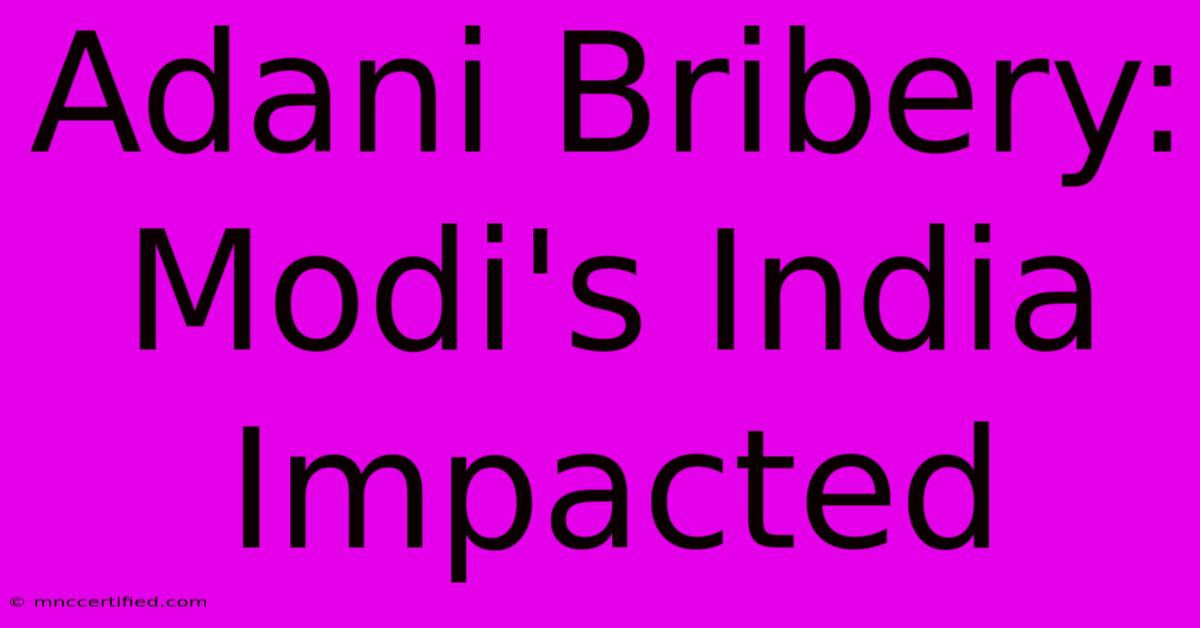Adani Bribery: Modi's India Impacted

Table of Contents
Adani Bribery Allegations: Impact on Modi's India
The Adani Group, one of India's largest conglomerates, has recently been embroiled in a major controversy involving allegations of stock manipulation and accounting fraud. These allegations, detailed in a report by the US-based Hindenburg Research, have sent shockwaves through India's financial markets and raised serious questions about the relationship between the Adani Group and the government of Prime Minister Narendra Modi. This article will delve into the specifics of the allegations, their potential impact on India's economy and global standing, and the broader implications for Modi's administration.
The Hindenburg Report: Key Allegations
The Hindenburg Research report leveled several serious accusations against the Adani Group, including:
-
Stock Manipulation: The report alleges that the Adani Group engaged in a massive stock manipulation scheme, using a network of shell companies to inflate its stock prices artificially. This alleged scheme allegedly allowed the Adani Group to raise billions of dollars through share offerings while concealing the true financial health of the company.
-
Accounting Fraud: Hindenburg accused the Adani Group of engaging in accounting fraud, misrepresenting its financial performance and assets to attract investors. This includes claims of inflated revenue figures and hidden debt.
-
Lack of Transparency: The report highlighted a lack of transparency in the Adani Group's financial dealings, making it difficult to independently verify the accuracy of their financial statements. This lack of transparency is a key concern for investors and regulators alike.
The Political Fallout: Modi's Relationship with Adani
The Adani Group's close ties to Prime Minister Narendra Modi have been a subject of much discussion and scrutiny. Modi's relationship with Gautam Adani, the chairman of the Adani Group, dates back several decades. Critics allege that this relationship has given the Adani Group an unfair advantage in securing lucrative government contracts and favorable regulatory treatment. The Hindenburg report, while not explicitly accusing Modi of wrongdoing, has intensified this criticism, prompting calls for greater transparency and accountability.
Impact on India's Global Image
The Adani controversy has undoubtedly damaged India's international reputation. Foreign investors are increasingly concerned about the potential risks associated with investing in India, given the lack of transparency and the apparent cozy relationship between the government and big business. This could lead to decreased foreign direct investment (FDI) and a slowdown in economic growth.
Economic Implications: A Shaky Foundation?
The allegations against the Adani Group have significant implications for the Indian economy. The group's diverse portfolio spans key sectors, including ports, power generation, and renewable energy. A significant financial setback for the Adani Group could have cascading effects on these sectors and on the broader Indian economy. The impact on investor confidence, both domestic and foreign, could lead to market volatility and potentially hinder economic growth.
The Road Ahead: Investigations and Reforms
The allegations require thorough and independent investigations to determine the truth. While the Indian government has defended its actions, the need for increased regulatory oversight and transparency in the financial sector is undeniable. Any meaningful reform must address concerns about conflicts of interest and ensure a level playing field for all businesses.
Conclusion:
The Adani bribery allegations represent a significant challenge for India and the Modi government. The long-term consequences for India's economy, its global reputation, and its political landscape remain to be seen. However, the controversy underscores the urgent need for stronger corporate governance, improved regulatory frameworks, and greater transparency in India's financial markets. The international community will be watching closely to see how India addresses these issues and restores confidence in its economy and institutions. Transparency and accountability are critical to rebuilding trust and ensuring the long-term health of India's economy.

Thank you for visiting our website wich cover about Adani Bribery: Modi's India Impacted. We hope the information provided has been useful to you. Feel free to contact us if you have any questions or need further assistance. See you next time and dont miss to bookmark.
Featured Posts
-
Storm Bert Amber Warning Transport Scotland
Nov 22, 2024
-
Nl Cy Young Atlantas Sale Victorious
Nov 22, 2024
-
Rev Richard Coles His Music Career
Nov 22, 2024
-
Jussie Smollett Conviction Illinois Supreme Court Ruling
Nov 22, 2024
-
Julian Lewis Commits Colorado Football
Nov 22, 2024